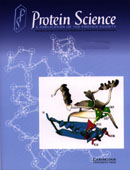Article contents
Change in backbone torsion angle distribution on protein folding
Published online by Cambridge University Press: 01 June 2000
Abstract
Understanding protein folding requires the determination of the configurational space accessible to the protein at different stages in folding. Here, computer simulation analysis of small angle neutron scattering results is used to probe the change in the distribution of configurations on strong denaturation of a globular protein, phosphoglycerate kinase, in 4 M guanidine hydrochloride solution. To do this atomic-detail ensembles of the unfolded protein chain are modeled and their scattering profiles compared with the experiment. The local conformational statistics are found to strongly influence the experimental intensity at scattering vectors between 0.05 and 0.3 Å−1. Denaturation leads to a reduction in the protein atom-pair distance distribution function over the ∼3–15 Å region that is associated with a quantifiable shift in the backbone torsional angle (φ,ψ) distribution toward the β region of the Ramachandran plot.
Keywords
- Type
- Research Article
- Information
- Copyright
- 2000 The Protein Society
- 8
- Cited by




